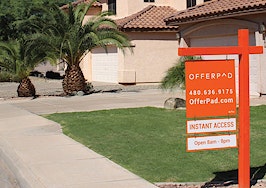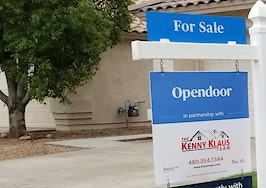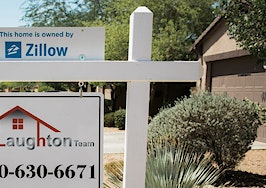Well-funded online homebuying and re-selling startup Opendoor already offers customers in 17 markets across the U.S. a compelling idea: visit its website, enter in information about your home, and get an all-cash offer within 1 to 2 days that you can accept instantly, minus a transaction fee. But now the company wants to go a step further: it hopes to someday offer its services to consumers for free, according to Opendoor CEO Eric Wu.
On Monday, Wu outlined his vision during a panel session at the Techonomy 18 technology conference in Half Moon Bay, California, at a hotel perched on an oceanside bluff.
In his opening statement on the panel, Wu said Opendoor wanted to make real estate transactions both “frictionless” and “over time, a free experience.” He repeated this goal later on and added that it “requires patience and requires time.”

Opendoor CEO Eric Wu. Credit: Opendoor
In addition to providing a “frictionless and eventually free” real estate transaction to consumers, Wu charted a roadmap that includes driving down real estate commissions, doubling Opendoor’s market share every year, perfecting a “self-service” experience for buyers and sellers and potentially providing its technology to homes “outside its network.”
His statements appeared to mark the first time that Opendoor has announced plans to somehow make selling and/or buying a home on its website and app free.
Asked for more explanation on Wu’s comments, an Opendoor spokesperson declined to offer any insight to Inman on how Opendoor could make its service free. They also would not elaborate on any other plans Wu discussed during the panel.
Some industry observers wonder why U.S. real estate agents earn an average commission of roughly 5.5 percent and believe that “fee compression” is on the horizon, Wu said during the panel.
Opendoor currently charges homesellers an average fee of 6.2 percent if they accept its all-cash offers (but the fee can range from 6 to 12 percent). It can earn revenue both by charging this fee and by re-selling homes for a higher price than it buys them for.
However, the startup is insistent that it purchases homes at full market value. It says it may only fetch premiums by increasing the home’s value through repairs or by cashing in on natural price appreciation.
Despite levying a relatively high fee to sellers, the startup positions its service as cheaper than using a real estate agent — in part because it doesn’t ask for seller concessions — and it plans to significantly strengthen this purported price advantage over time.
“We know that the transaction is too expensive, and it’s painful today, and hopefully companies like Opendoor can automate a lot of the steps to remove cost from the system and create that fee compression,” he said.
“Fee compression” may not even be right term to describe Opendoor’s long-term pricing goal. Perhaps “fee elimination” works better.
However, that still raises the question: if its core service is provided for free, how will Opendoor make any money? Wu may have provided some clues about other potential sources of revenue at the event.
One might be to provide on-demand design and renovation services to homebuyers. On the panel, Wu said a “dream” would be to offer what sounded like an Amazon-like ordering experience for buyers who purchase its homes. They could add items to a shopping cart, such as a Nest or “energy-efficient” home option, he said. Presumably, these would cost more and Opendoor could charge fees on top of them.
Wu also said that Opendoor has noticed many people would like to outfit their homes with the system of sensors and smart locks that Opendoor equips on its for-sale homes, allowing prospective buyers to tour its properties without an agent. He said the startup is thinking about making the system available to “homes outside our network,” but that he remains unsure of whether the startup would do so.
Opendoor’s vision to make buying and selling free may include pairing homeowners who sell to Opendoor with partner or in-house agents to also help those sellers purchase a new home. The company recently acquired Open Listings, a discount brokerage and referral platform, to service homebuyers, usually by connecting them with agents who work at outside brokerages. Opendoor has also baked in-house mortgage and title services into an optional all-in-one offering for customers. It’s unclear whether, in the future, Opendoor might charge for those services while purportedly providing its flagship buying and selling service for free.
Wu also emphasized Opendoor’s goal to perfect a “self-service” transaction experience for consumers, describing this as a “focal point” for the startup. The “vast majority” of consumers entering the market desire a product that’s simple and transparent and has some element of self-service, he said.
This focus, along with Opendoor’s plan to make its service free, seem to be in tension with Opendoor’s stated desire to coexist harmoniously with the existing real estate industry and agents.
It’s taken recent steps towards this end by leveraging partnerships with agents that work at outside brokerages, such as a program under which Opendoor will co-list some of its homes with partner agents, as well as the aforementioned Open Listings acquisition. But if the startup’s ambition is provide an alternative to traditional brokerage services at no cost, it’s hard to imagine how it might maintain a friendly relationship with the industry establishment.
During the panel, Wu offered some insight into how Opendoor has managed to borrow so much money — more than $2.5 billion so far — to snap up homes.
The business model is “lower risk than other asset classes to invest in,” he said, because Opendoor’s assets — the homes it buys — are “only on our books for 90 days,” before the startup sells them on the open market.
“That’s a very attractive product for lenders,” he said.
These investors have so far been undeterred by the prospect that Opendoor might struggle to sell its acquisitions (and pay off its debt as quickly) when the market turns south.
Wu acknowledged that Opendoor isn’t “fully cycle-tested” yet. But it has demonstrated with data that the business model can work well during flat markets, he said. More market volatility, he noted, could increase demand for the fast and certain sale that Opendoor promises to sellers.
And, he added, “we can toggle the fee based on what we’re seeing in the market.”
Opendoor currently operates in the following 17 markets:
- Phoenix, Arizona
- Dallas-Ft. Worth, Texas
- Las Vegas, Nevada
- Atlanta, Georgia
- Orlando, Florida
- Raleigh, North Carolina
- Charlotte, North Carolina
- San Antonio, Texas
- Nashville, Tennessee
- Tampa, Florida
- Minneapolis, Minnesota
- Houston, Texas
- Sacramento, California
- Riverside, California
- Denver, Colorado
- Portland, Oregon
- Austin, Texas
It plans to be buying and selling homes in 50 markets by the end of 2020.
It has snatched about 5 percent marketshare in a handful of those markets, and “that’s roughly doubling every year,” Wu said. Those markets may include Phoenix, the Dallas-Fort Worth area and Atlanta, where it has, respectively, 515, 582 and 369 listings.
“We’ll be servicing the vast majority of real estate in these cities,” Wu added, speaking of the few high-growth markets.









